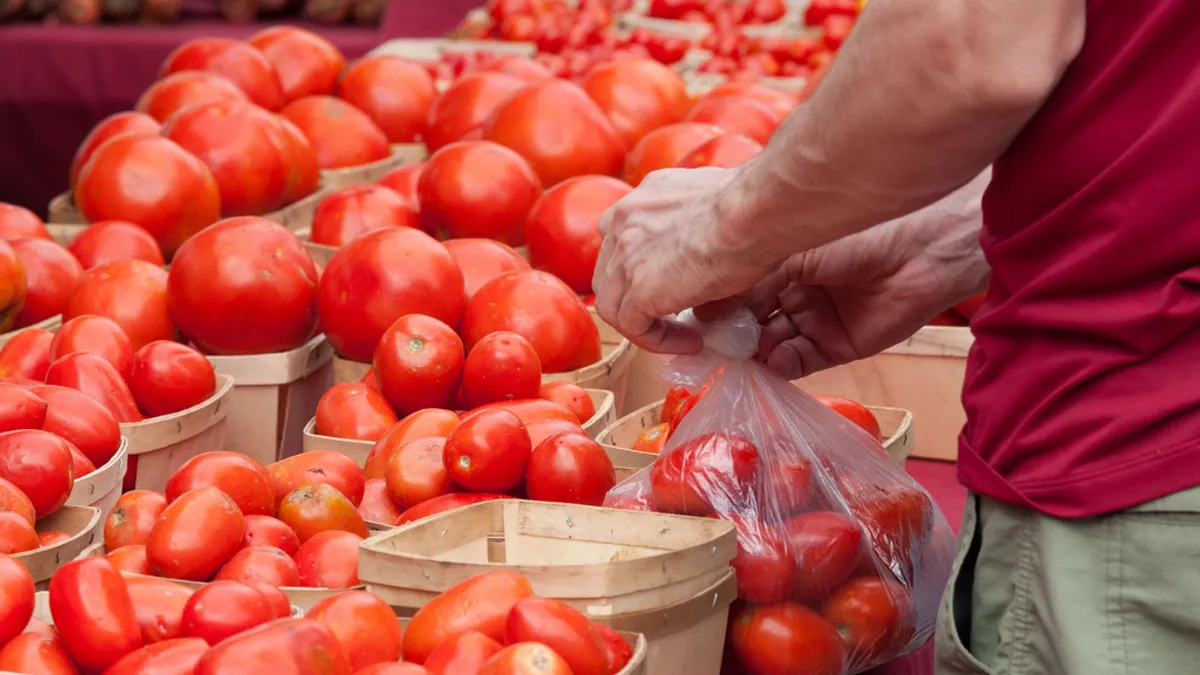Dive Brief:
- The U.S. Department of Commerce finalized a deal with the Mexican government last week removing tariffs on imported tomatoes, but inspection provisions in the final deal are concerning importers that tomatoes will be held up at the border.
- The new inspection process is one result of the agreement struck in August to end an anti-dumping investigation into Mexican tomato imports by the Commerce Department, and with it, a 17.5% tariff. At that time, the Fresh Produce Association of the Americas (FPAA) expressed concern the inspection provisions "will snarl border traffic and damage [the] U.S. tomato market." The FPAA went on to call the inspection provisions a "non-tariff trade barrier." The final deal stipulates inspections of certain tomato varieties are mandatory and may take up to 48 hours.
- "The agreement also closes loopholes from past suspension agreements that permitted sales below the reference prices in certain circumstances, and includes an inspection mechanism to prevent the importation of low-quality, poor-condition tomatoes from Mexico, which can have price-suppressive effects on the market," describes the Commerce Department's press release announcing the final deal.
Dive Insight:
Though all concerned parties supported the deal the two governments reached in August, the inspection provisions were already raising concerns from importers. The Commerce Department said last week the inspection provisions are intended to maintain quality standards, but industry buyers are balking at that claim.
Walmart's senior director of federal government affairs James R. Bailey reportedly wrote in an email to the Commerce Department, "Given the high quality and low failure rate of Mexican tomatoes, such intensive inspections do not seem proportionate to the risk," according to the Produce News.
Bailey encouraged the department to tailor the inspection program based on "risk and need" as it is for other produce categories.
The agreement stipulates the USDA will inspect "all Round and Roma tomatoes (including Stem On) and grape tomatoes in bulk," within 48 hours receiving a request. "At locations that normally have USDA inspectors in the area, a USDA inspector will normally arrive within 24 hours of the official request for inspection by the importer," reads the agreement. For perishable products traversing high-traffic border crossings, these time tables could mandate operational changes from growers and buyers.
Bailey wrote, under this agreement, the USDA could be required to inspect up to 92% of imported tomatoes. Though the Commerce Department has put the figure closer to 66%, according to Bailey, he wrote these levels mark "a substantial increase in the current inspection rates for imported tomatoes."
Bailey stipulated while Walmart purchases tomatoes from 21 U.S. states, Mexican (and Canadian) tomatoes are essential to maintain a consistent supply of the many varieties the grocer offers year-round.
"We would urge the Department to calibrate the inspections to a more appropriate rate that does not cause delay at the port of entry for tomatoes or other produce items,” wrote Bailey.
Secretary of Commerce Wilbur Ross said the deal protects U.S. tomato producers.













